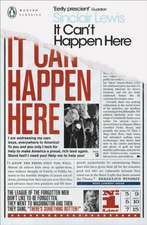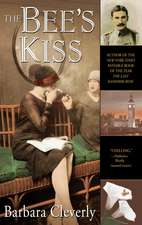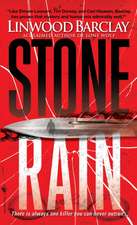A Darker God: Laetitia Talbot Mysteries
Autor Barbara Cleverlyen Limba Engleză Paperback – 28 feb 2010
In the open-air theatre of the dark god Dionysos, Letty watches a performance of an ancient Greek tragedy. But the revenge that is exacted onstage, the dagger that is wielded, and the blood that flows in full view of the audience are not theatrical effects. As Letty digs for clues, she unearths disturbing secrets and dark animosities with catastrophic implications worthy of a Sophocles—but of far more recent vintage.
Now, as a killer cuts a merciless swath across a country in the throes of political instability, Letty herself steps unawares into the murderer’s savage spotlight—a light so bright she may not be able to see the dark figure behind it until it’s too late.
Preț: 110.36 lei
Nou
Puncte Express: 166
Preț estimativ în valută:
21.13€ • 22.04$ • 17.71£
21.13€ • 22.04$ • 17.71£
Carte tipărită la comandă
Livrare economică 13-27 martie
Preluare comenzi: 021 569.72.76
Specificații
ISBN-13: 9780385339919
ISBN-10: 0385339917
Pagini: 397
Dimensiuni: 133 x 214 x 23 mm
Greutate: 0.31 kg
Editura: Bantam Books
Seria Laetitia Talbot Mysteries
ISBN-10: 0385339917
Pagini: 397
Dimensiuni: 133 x 214 x 23 mm
Greutate: 0.31 kg
Editura: Bantam Books
Seria Laetitia Talbot Mysteries
Notă biografică
Barbara Cleverly is an award-winning writer of seven novels including the New York Times Notable Book The Last Kashmiri Rose. She lives in Cambridge, England. Delta publishes both Ms. Cleverly's Joe Sandilands novels and her acclaimed Laetitia Talbot series (Bright Hair About the Bone) in the United States.
Extras
Chapter 1
May 16, 1928. London.
George the Second, High King of the Hellenes, was decidedly not on his way back home to Greece. He would have been turned back at the border had he attempted to enter the country, his passport confiscated. He was striding about his room in Brown's Hotel in the heart of Mayfair, dressing for the evening's performance at Covent Garden. He hummed a snatch of the opera he'd seen the night before: Siegfried. Tonight he would enjoy Tannhauser and, after a day to recruit his strength, Gotterdamerung.
He posed himself before the cheval glass checking his tailcoat and white tie with a critical eye. His valet stood by anxiously with a clothes brush in hand. After a well-judged interval, an imperious finger pointed to a thread, a speck, a flake, invisible to any but the kingly eye. The valet silently flicked with the brush, tilted his head and surveyed the royal shoulder afresh, administered a second judicious flick, and stood back. Brooking was on loan from the Marquis of Melton to the King of the Hellenes for the duration of his stay in London, and Brooking was longing for the Wagner season to be over.
The evening clothes were perfect and perfectly fitted the elegant figure. Fussy bugger, was Brooking's opinion of his temporary master--but a rewarding man to dress. He knew how to wear a suit, all right. In the prime of his life--thirty-eight years old according to his passport (Brooking had checked)--his spine was as straight as a flagpole, his shoulders square, his bearing reflecting his formative years in the Prussian Guard. Unable to challenge the valet further, George lingered in front of the mirror, as he always did, apparently finding surprising and rather distasteful the image of himself in anything other than uniform. An active soldier, he had risen to the rank of Major General in the war against Turkey and had been devastated when he had been stripped of his military rank, along with his Greek nationality and his possessions, four years before. Forced out of office and into exile by a Revolutionary Committee. A committee led by a man who had become his personal enemy, his cynical tormentor.
But it could have been worse. At least he'd fared better than his Russian kindred; George II Oldenburg still had his handsome head on his shoulders. And the courts of Europe, many of them stocked with German relations of one sort or another, welcomed him. With Queen Victoria as his great-grandmamma, what doors would not open to him? He was a notable and sought-after figure on the social scene. "And, of course, George of Greece will be of the party . . ." were the words every hostess longed to utter.
"Your Majesty will be unaccompanied this evening?" Brooking thought he'd better check arrangements.
This evening, George would be sharing a box at the Royal Opera House with a crowd of like-minded Wagner lovers and he did not for one moment give any sign that he pined for the presence of his dark and beautiful queen at his elbow. His wife, Elisabeth, had elected to live out the years of exile in her own country of Romania, where from time to time, and increasingly rarely, George joined her. They had no children and were no longer intime. He remembered with a shudder one of her more reckless pronouncements. With a face like Medea she'd said: "I've committed every vice in my life except murder, and I don't want to die without doing that either." And she'd smiled at him. George had no intention of providing the means of fulfilling his queen's last desire.
"I go alone," he told Brooking with satisfaction.
A brisk tap at the door prompted a curt "See who that is."
The valet returned, unable to conceal a slight tension. "A gentleman wishes to see you, sir."
"At this unreasonable hour? Everyone's dressing! Why have they let him up?"
"I have explained that you are engaged for the evening, but he is most insistent. A young gentleman of Teutonic bearing, sir. Name of Kellerman. A Major Kellerman."
A card was handed over.
George studied it, his face expressionless. "Show the major in and leave us. Do not return on any pretext until you see him depart."
Brooking performed his duties calmly, then scurried down the stairs to take refuge in the Snug Bar of the pub opposite. From there, he could keep an eye on the door and be ready to hurry back as soon as the young gentleman left. He was taking the last swig of his pint and beginning to wonder whether he'd missed the visitor when he spotted him striding back down Albemarle Street towards Piccadilly.
When he returned, he found the king deep in thought. His long face was invariably lugubrious, but his unscheduled meeting had given him something of the appearance of a colicky horse, Brooking thought. Unusually, he was seated. He seemed not to notice that Brooking was back in the room and hovering anxiously. Finally, with a discreet cough, the valet decided to move things on. "Your taxi, sir? Would you like me to go down and have the doorman whistle one up for you? You have half an hour before the curtain goes up."
"No. I find I have to cancel my evening. No time to change. Get my theatre cloak, will you?" Suddenly resolute, he got to his feet. "I'm going out. To St. James's. I shall walk. You may expect me back by ten o'clock."
As Brooking held the door open, George paused and muttered:
" 'Mine honour is my life; both grow in one;
Take honour from me, and my life is done.'
"Wise words, don't you think, Brooking? A sentiment worth having?"
"Indeed, sir." Brooking had grown accustomed to responding with a fitting remark to the Challenge of the Quotation. "Would that be your German hero, Siegfried, speaking, sir? On contemplating a little dragon-slaying?"
"No." George shook his head. "That would be your English King Richard the Second, on contemplating his imminent death . . . But your mention of dragon-slaying is not inapposite."
The king's lips twitched in something very like a smile, and with a flash of unprecedented humour, he held out his arms for attention. "Yes, Brooking! Pass me my breastplate and helmet, would you? George has another dragon to slay!"
Chapter 2
May 30, 1928. Scotland Yard, London.
Chief Inspector Percy Montacute waited to hear the discreet click as he gently closed the Assistant Commissioner's polished mahogany door behind him. He squared his shoulders and, with a suave smile and a greeting for all he encountered along the carpeted corridors of the third floor of Scotland Yard, Montacute made his way back to his own more modest office.
Once safely inside, he let out a roar, threw his file onto the desk, and aimed a fly half's mighty kick at the wastepaper basket, sending it careering across the room, spilling torn papers and envelopes as it went. Next he aimed a vicious right jab at the hat stand and knocked it to the floor. The stream of inventive oaths accompanying this activity would have raised admiring eyebrows amongst the men of his squad. Percy's explosions were not frequent but they were famed throughout the Force, and from the first rumblings announcing one, men gathered to listen. A safe procedure, since the Governor had never been known to vent his wrath on his own men. The targets of his fanciful and anatomically taxing suggestions--villains, politicians, and superior officers--always deserved it.
Red with rage, he fought to open the window and stuck his head out to take a few calming breaths of air. A hot May, a southerly breeze over the Embankment, and a low tide on the stinking Thames combined to frustrate him and had him slamming shut the window again. He stalked to his desk and rang a bell. The door opened at once and the young detective constable on duty looked in. He'd clearly been waiting close by, drawn by the sudden noise.
"Ah! Constable! Bring me a mug of tea, will you?" The voice was controlled and friendly. D.C. Perkins was reassured that he was in no way the object of Percy's murderous impulse.
"Right you are, sir. Got a pot brewing right now. Be with you in a tick." The young copper paused and lifted his eyes discreetly from the paper-strewn carpet. His voice took on a musing tone as he enquired: "Er . . . would you like me to send for one of the cleaning ladies? Looks as if they missed you this morning, sir? There's one of 'em just down the corridor rubbing up the nameplates. I can divert her up here for a spell . . ."
"Thank you, Constable. No need. I made the mess. And I'm still relishing it. I may yet add to it. I'll clear it up myself when I can bear it no longer. Now, what about that tea?"
Even the tea, served up in his special pint mug, did its bit to fan the flames of Percy's anger. He pictured the Assistant Commissioner sipping coffee from a Wedgwood china cup and his lip curled. He cursed his superior officer once again for an overbred, overpromoted, overconnected nincompoop. The man was unaware enough to be reporting back to the Chief Commissioner right now between sips of his fragrant Blue Mountain that the interview had gone according to plan. In fact, Chief Inspector Montacute, he might be saying--and Percy imagined their conversation with no difficulty--didn't appear to be quite the oik some people made out. (This use of the vernacular would be accompanied by an apologetic laugh.) . . . A nobody, of course, who'd reached the high-water mark of his career--and damned lucky to have got so far . . . a man of his dubious background . . . (Percy knew that "dubious" was probably the most polite description of his antecedents they could come up with. He was used to much worse.) . . . "It could never have happened before the war!" they'd have told each other, shaking their heads. Nevertheless, a surprisingly able detective. Chestful of medals, if he ever cared to parade them. Educated, too. Not many chaps about these days who could make a joke in ancient Greek . . . If it was a joke? If it was ancient Greek? One couldn't always be certain with Montacute. Could just as easily have been playing the smart-arse . . .
They might have concluded with the thought that, at any rate, the oik had agreed, with some reservations it had to be said, to fall in with their suggestions. Yes, his secondment to Greece was in the bag. They hadn't left him much time to consider it--quite deliberately--and the officer was most probably packing his tropical kit already. Yes, on the whole, it had gone well. Two birds killed with one stone. And the royal families of two countries would be graciously thankful . . .
An ominous unfinished comment which, in its oily and suggestive way, succeeded not in tantalising Percy Montacute but in raising his hackles.
"Sod the royal family!" he thought traitorously. "And sod their Greek cousins!" He snorted with derision. Greek! They were no more Greek than he was! German, weren't they? Or Danish? Throneless, anyway. Their King George was swanning around the capitals of Europe making mischief. In London right now, if Percy wasn't mistaken. Enjoying the Wagner extravaganza at the Opera House. In exile these four years. Kicked out for the second time. Surely they'd at last taken the hint? The modern Greece clearly considered itself a Republic as well as a Democracy. Percy couldn't imagine the circumstances in which a deposed royal family would have any cause to be "graciously thankful" to him.
He concentrated and tried to pull together his sketchy political knowledge. The king and his archenemy, the Cretan hero, Prime Minister-in-waiting Venizelos, were like figures in a Swiss weather clock. You never saw them both at the same time. One popped out as the other popped in. Sun and rain. Perhaps as well they didn't have a face-to-face encounter? Now, hadn't Venizelos also been here in London . . . ? There'd been something in the newspapers . . . A wedding photograph? Yes! Yes, that was it! Several years ago now . . . The elderly statesman and revolutionary had been getting married. In a Highgate registry office. Percy had almost shed a sentimental tear with the rest of the nation at the report. Twenty-seven years after the death of his adored first wife, the old feller had been getting hitched again to the resounding congratulations and back-slapping of admiring Londoners who loved nothing so much as a nice love story.
And what a plum he'd picked! Venizelos's bride was a younger and very rich and lively Greek-English lady. Percy had been intrigued to note that the happy couple had set off for California after their marriage. Tireless travellers, the pair of them. Percy approved. She was a politically ambitious lady, the second Mrs. Venizelos, by all accounts. And with her on his arm, the past and perhaps future prime minister of Greece was preparing to return to his homeland. To take up the reins of power after the summer's elections? Percy was uneasy. Did these events have any bearing on his own coming assignment? He didn't welcome a political element to crime-fighting. Diplomatic skulduggery was someone else's province.
And what had all that been about--the business the Assistant Commissioner had sneaked in towards the end of the interview? Percy frowned as he recollected the increase in speed of the man's speech, the dismissive delivery, the refocusing of the attention to a point over his shoulder, the accompanying bland smile--all signs, to Percy's experienced eye, that they had arrived at the crux of the matter at last.
The remarks slid in innocently enough, eased by the usual references to acquaintances in common: "You were in the same regiment as my old friend so-and-so, I think? Good! Good! You should look him up--he's presently in Athens at the Embassy . . . Oh, and by the way . . . there's a chap out there we'd like you to meet . . . bit of a live wire--ha! ha!--just your type . . . Does the name 'Merriman' ring any bells? A distant tinkle? Thought it might. He's quite the scholar but a man of action, too . . . rather too active for comfort, some do think . . . You'll have a lot in common. We'll give you an introduction. Understand you trod the boards, Montacute, during your stint at Oxford? Familiar with the playwright Aeschylus, are you? To be specific--his Agamemnon? Excellent! Excellent! Funny how these things work out, isn't it? Look--there's just a possibility our chap Merriman may be in need of a bit of surveillance, er . . . guidance, firm hand under the elbow, don't you know? Or even . . . um . . . direct action. We'll arrange it."
May 16, 1928. London.
George the Second, High King of the Hellenes, was decidedly not on his way back home to Greece. He would have been turned back at the border had he attempted to enter the country, his passport confiscated. He was striding about his room in Brown's Hotel in the heart of Mayfair, dressing for the evening's performance at Covent Garden. He hummed a snatch of the opera he'd seen the night before: Siegfried. Tonight he would enjoy Tannhauser and, after a day to recruit his strength, Gotterdamerung.
He posed himself before the cheval glass checking his tailcoat and white tie with a critical eye. His valet stood by anxiously with a clothes brush in hand. After a well-judged interval, an imperious finger pointed to a thread, a speck, a flake, invisible to any but the kingly eye. The valet silently flicked with the brush, tilted his head and surveyed the royal shoulder afresh, administered a second judicious flick, and stood back. Brooking was on loan from the Marquis of Melton to the King of the Hellenes for the duration of his stay in London, and Brooking was longing for the Wagner season to be over.
The evening clothes were perfect and perfectly fitted the elegant figure. Fussy bugger, was Brooking's opinion of his temporary master--but a rewarding man to dress. He knew how to wear a suit, all right. In the prime of his life--thirty-eight years old according to his passport (Brooking had checked)--his spine was as straight as a flagpole, his shoulders square, his bearing reflecting his formative years in the Prussian Guard. Unable to challenge the valet further, George lingered in front of the mirror, as he always did, apparently finding surprising and rather distasteful the image of himself in anything other than uniform. An active soldier, he had risen to the rank of Major General in the war against Turkey and had been devastated when he had been stripped of his military rank, along with his Greek nationality and his possessions, four years before. Forced out of office and into exile by a Revolutionary Committee. A committee led by a man who had become his personal enemy, his cynical tormentor.
But it could have been worse. At least he'd fared better than his Russian kindred; George II Oldenburg still had his handsome head on his shoulders. And the courts of Europe, many of them stocked with German relations of one sort or another, welcomed him. With Queen Victoria as his great-grandmamma, what doors would not open to him? He was a notable and sought-after figure on the social scene. "And, of course, George of Greece will be of the party . . ." were the words every hostess longed to utter.
"Your Majesty will be unaccompanied this evening?" Brooking thought he'd better check arrangements.
This evening, George would be sharing a box at the Royal Opera House with a crowd of like-minded Wagner lovers and he did not for one moment give any sign that he pined for the presence of his dark and beautiful queen at his elbow. His wife, Elisabeth, had elected to live out the years of exile in her own country of Romania, where from time to time, and increasingly rarely, George joined her. They had no children and were no longer intime. He remembered with a shudder one of her more reckless pronouncements. With a face like Medea she'd said: "I've committed every vice in my life except murder, and I don't want to die without doing that either." And she'd smiled at him. George had no intention of providing the means of fulfilling his queen's last desire.
"I go alone," he told Brooking with satisfaction.
A brisk tap at the door prompted a curt "See who that is."
The valet returned, unable to conceal a slight tension. "A gentleman wishes to see you, sir."
"At this unreasonable hour? Everyone's dressing! Why have they let him up?"
"I have explained that you are engaged for the evening, but he is most insistent. A young gentleman of Teutonic bearing, sir. Name of Kellerman. A Major Kellerman."
A card was handed over.
George studied it, his face expressionless. "Show the major in and leave us. Do not return on any pretext until you see him depart."
Brooking performed his duties calmly, then scurried down the stairs to take refuge in the Snug Bar of the pub opposite. From there, he could keep an eye on the door and be ready to hurry back as soon as the young gentleman left. He was taking the last swig of his pint and beginning to wonder whether he'd missed the visitor when he spotted him striding back down Albemarle Street towards Piccadilly.
When he returned, he found the king deep in thought. His long face was invariably lugubrious, but his unscheduled meeting had given him something of the appearance of a colicky horse, Brooking thought. Unusually, he was seated. He seemed not to notice that Brooking was back in the room and hovering anxiously. Finally, with a discreet cough, the valet decided to move things on. "Your taxi, sir? Would you like me to go down and have the doorman whistle one up for you? You have half an hour before the curtain goes up."
"No. I find I have to cancel my evening. No time to change. Get my theatre cloak, will you?" Suddenly resolute, he got to his feet. "I'm going out. To St. James's. I shall walk. You may expect me back by ten o'clock."
As Brooking held the door open, George paused and muttered:
" 'Mine honour is my life; both grow in one;
Take honour from me, and my life is done.'
"Wise words, don't you think, Brooking? A sentiment worth having?"
"Indeed, sir." Brooking had grown accustomed to responding with a fitting remark to the Challenge of the Quotation. "Would that be your German hero, Siegfried, speaking, sir? On contemplating a little dragon-slaying?"
"No." George shook his head. "That would be your English King Richard the Second, on contemplating his imminent death . . . But your mention of dragon-slaying is not inapposite."
The king's lips twitched in something very like a smile, and with a flash of unprecedented humour, he held out his arms for attention. "Yes, Brooking! Pass me my breastplate and helmet, would you? George has another dragon to slay!"
Chapter 2
May 30, 1928. Scotland Yard, London.
Chief Inspector Percy Montacute waited to hear the discreet click as he gently closed the Assistant Commissioner's polished mahogany door behind him. He squared his shoulders and, with a suave smile and a greeting for all he encountered along the carpeted corridors of the third floor of Scotland Yard, Montacute made his way back to his own more modest office.
Once safely inside, he let out a roar, threw his file onto the desk, and aimed a fly half's mighty kick at the wastepaper basket, sending it careering across the room, spilling torn papers and envelopes as it went. Next he aimed a vicious right jab at the hat stand and knocked it to the floor. The stream of inventive oaths accompanying this activity would have raised admiring eyebrows amongst the men of his squad. Percy's explosions were not frequent but they were famed throughout the Force, and from the first rumblings announcing one, men gathered to listen. A safe procedure, since the Governor had never been known to vent his wrath on his own men. The targets of his fanciful and anatomically taxing suggestions--villains, politicians, and superior officers--always deserved it.
Red with rage, he fought to open the window and stuck his head out to take a few calming breaths of air. A hot May, a southerly breeze over the Embankment, and a low tide on the stinking Thames combined to frustrate him and had him slamming shut the window again. He stalked to his desk and rang a bell. The door opened at once and the young detective constable on duty looked in. He'd clearly been waiting close by, drawn by the sudden noise.
"Ah! Constable! Bring me a mug of tea, will you?" The voice was controlled and friendly. D.C. Perkins was reassured that he was in no way the object of Percy's murderous impulse.
"Right you are, sir. Got a pot brewing right now. Be with you in a tick." The young copper paused and lifted his eyes discreetly from the paper-strewn carpet. His voice took on a musing tone as he enquired: "Er . . . would you like me to send for one of the cleaning ladies? Looks as if they missed you this morning, sir? There's one of 'em just down the corridor rubbing up the nameplates. I can divert her up here for a spell . . ."
"Thank you, Constable. No need. I made the mess. And I'm still relishing it. I may yet add to it. I'll clear it up myself when I can bear it no longer. Now, what about that tea?"
Even the tea, served up in his special pint mug, did its bit to fan the flames of Percy's anger. He pictured the Assistant Commissioner sipping coffee from a Wedgwood china cup and his lip curled. He cursed his superior officer once again for an overbred, overpromoted, overconnected nincompoop. The man was unaware enough to be reporting back to the Chief Commissioner right now between sips of his fragrant Blue Mountain that the interview had gone according to plan. In fact, Chief Inspector Montacute, he might be saying--and Percy imagined their conversation with no difficulty--didn't appear to be quite the oik some people made out. (This use of the vernacular would be accompanied by an apologetic laugh.) . . . A nobody, of course, who'd reached the high-water mark of his career--and damned lucky to have got so far . . . a man of his dubious background . . . (Percy knew that "dubious" was probably the most polite description of his antecedents they could come up with. He was used to much worse.) . . . "It could never have happened before the war!" they'd have told each other, shaking their heads. Nevertheless, a surprisingly able detective. Chestful of medals, if he ever cared to parade them. Educated, too. Not many chaps about these days who could make a joke in ancient Greek . . . If it was a joke? If it was ancient Greek? One couldn't always be certain with Montacute. Could just as easily have been playing the smart-arse . . .
They might have concluded with the thought that, at any rate, the oik had agreed, with some reservations it had to be said, to fall in with their suggestions. Yes, his secondment to Greece was in the bag. They hadn't left him much time to consider it--quite deliberately--and the officer was most probably packing his tropical kit already. Yes, on the whole, it had gone well. Two birds killed with one stone. And the royal families of two countries would be graciously thankful . . .
An ominous unfinished comment which, in its oily and suggestive way, succeeded not in tantalising Percy Montacute but in raising his hackles.
"Sod the royal family!" he thought traitorously. "And sod their Greek cousins!" He snorted with derision. Greek! They were no more Greek than he was! German, weren't they? Or Danish? Throneless, anyway. Their King George was swanning around the capitals of Europe making mischief. In London right now, if Percy wasn't mistaken. Enjoying the Wagner extravaganza at the Opera House. In exile these four years. Kicked out for the second time. Surely they'd at last taken the hint? The modern Greece clearly considered itself a Republic as well as a Democracy. Percy couldn't imagine the circumstances in which a deposed royal family would have any cause to be "graciously thankful" to him.
He concentrated and tried to pull together his sketchy political knowledge. The king and his archenemy, the Cretan hero, Prime Minister-in-waiting Venizelos, were like figures in a Swiss weather clock. You never saw them both at the same time. One popped out as the other popped in. Sun and rain. Perhaps as well they didn't have a face-to-face encounter? Now, hadn't Venizelos also been here in London . . . ? There'd been something in the newspapers . . . A wedding photograph? Yes! Yes, that was it! Several years ago now . . . The elderly statesman and revolutionary had been getting married. In a Highgate registry office. Percy had almost shed a sentimental tear with the rest of the nation at the report. Twenty-seven years after the death of his adored first wife, the old feller had been getting hitched again to the resounding congratulations and back-slapping of admiring Londoners who loved nothing so much as a nice love story.
And what a plum he'd picked! Venizelos's bride was a younger and very rich and lively Greek-English lady. Percy had been intrigued to note that the happy couple had set off for California after their marriage. Tireless travellers, the pair of them. Percy approved. She was a politically ambitious lady, the second Mrs. Venizelos, by all accounts. And with her on his arm, the past and perhaps future prime minister of Greece was preparing to return to his homeland. To take up the reins of power after the summer's elections? Percy was uneasy. Did these events have any bearing on his own coming assignment? He didn't welcome a political element to crime-fighting. Diplomatic skulduggery was someone else's province.
And what had all that been about--the business the Assistant Commissioner had sneaked in towards the end of the interview? Percy frowned as he recollected the increase in speed of the man's speech, the dismissive delivery, the refocusing of the attention to a point over his shoulder, the accompanying bland smile--all signs, to Percy's experienced eye, that they had arrived at the crux of the matter at last.
The remarks slid in innocently enough, eased by the usual references to acquaintances in common: "You were in the same regiment as my old friend so-and-so, I think? Good! Good! You should look him up--he's presently in Athens at the Embassy . . . Oh, and by the way . . . there's a chap out there we'd like you to meet . . . bit of a live wire--ha! ha!--just your type . . . Does the name 'Merriman' ring any bells? A distant tinkle? Thought it might. He's quite the scholar but a man of action, too . . . rather too active for comfort, some do think . . . You'll have a lot in common. We'll give you an introduction. Understand you trod the boards, Montacute, during your stint at Oxford? Familiar with the playwright Aeschylus, are you? To be specific--his Agamemnon? Excellent! Excellent! Funny how these things work out, isn't it? Look--there's just a possibility our chap Merriman may be in need of a bit of surveillance, er . . . guidance, firm hand under the elbow, don't you know? Or even . . . um . . . direct action. We'll arrange it."
Descriere
Aspiring archaeologist and occasional detective Laetitia Talbot returns to 1920s Greece to stop a brutal killer in award-winning author Cleverly's new mystery.













